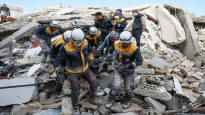The northwestern province of Idlib in Syria and the 4.5 million people who live there have become prisoners of a merciless world political game.
From the point of view of international aid organizations, Idlib has been in a state of humanitarian disaster for years, but the earthquake that struck at the beginning of the week made the situation even worse.
In the civil war in Syria that started more than ten years ago, the rebels were defeated against the forces of the Russian-backed government. The rebels have fled to Idlib.
Dominates the area now Islamist organization Tahrir al-Sham (you will switch to another service). It was formerly known as the al-Nusra Front, which was in close cooperation with the terrorist organization al-Qaeda. Tahrir al-Sham has cut ties with al-Qaeda, but it is still classified as a terrorist organization in the United States.
Although the main fighting in the Syrian civil war has stopped, the Syrian government has sought to weaken the rebel regime with continuous artillery and airstrikes. They were last seen in January.
Although Tahrir al-Sham nominally runs Idlib, its administrative structure and funding are non-existent. It does not have the capacity to organize large-scale clearing operations, let alone reconstruction. The clearing has been done mainly by volunteers, who are called white helmets.
No means of clearing the destruction
The international community has placed a strict boycott on Syria because of the atrocities against its own people. Idlib is indeed under a double boycott, as the Syrian government strictly restricts traffic entering the area.
For example, there is a dire shortage of excavators in the disaster area, as their importation has been limited due to sanctions.
Financial Times magazine (you will switch to another service) on Wednesday reached local residents north of Idlib, an area controlled by Turkish-backed forces. Residents said that due to the lack of heavy clearing equipment, the rescue teams are even trying to dig out the ruins by hand.
Foreign aid has started to arrive in the earthquake area, but the vast majority of it is taken to the affected population centers in Turkey.
Politics is made with humanitarian aid
The conditions of the residents of Idlib have been miserable long before the earthquake.
Because clean water has been hard to come by, there has been a cholera epidemic in the area. About one third of the region’s 4.5 million inhabitants are government opponents who have fled from other parts of the country. They have been settled in various temporary housing.
The Syrian government has been quick to point out that the difficulties of the residents of Idlib are precisely due to the sanctions imposed on Syria by Western countries.
The United States has emphasized that its sanctions program against Syria, the so-called Caesar Act, will not prevent the delivery of humanitarian aid.
In any case, the state of emergency caused by the earthquake and the actions of Syria force the Western countries to think about easing the sanctions.
The Syrian government demands that all aid coming to the country be channeled through it. In Western countries, there is a fear that the government will take political advantage of the aid coming from the West and present it as its own victory.
Syria has received some help in the form of airlifts from Iran, Iraq, the United Arab Emirates and Algeria. All flights have landed in an area controlled by the government.
The problem of border crossing
Transport connections to Idlib are also a big problem. Supplies could be brought to the area from Turkey. By decision of the Syrian government, there is only one border crossing in use: Bab al-Hawa. It is located in the northern part of the rebel area of Idlib, along the road from Turkey to Aleppo.
In the UN Security Council, it has often been suggested that more crossing points should be opened at the border. However, Russia has blocked the decisions with its veto.
The road leading to the Bab al-Hawa border crossing was also closed for several days due to earthquake damage. The first aid shipment, six truckloads of tents and other supplies, got through on Thursday, he says British Broadcasting Corporation BBC (switch to another service).
Aid work is also hampered by the division of the northern part of Syria into several occupation regimes. In addition to the Syrian government and the rebel area, there are areas in the northern part of the country under Kurdish administration and occupied by organizations supported by Turkey. It can be difficult or even impossible to move supplies and also information from one area to another.
Source: AFP
